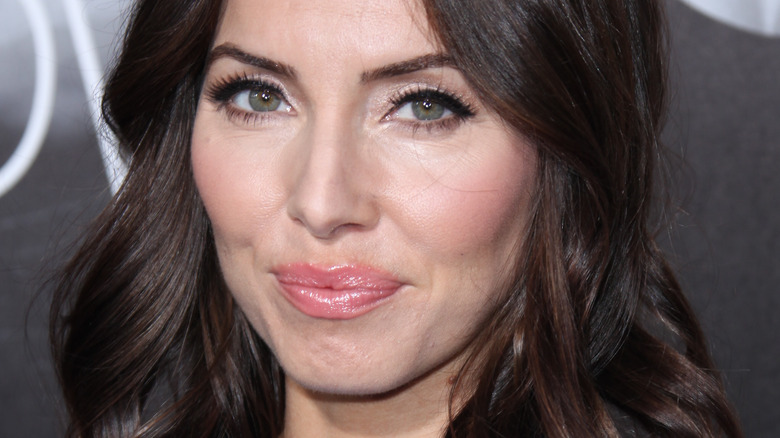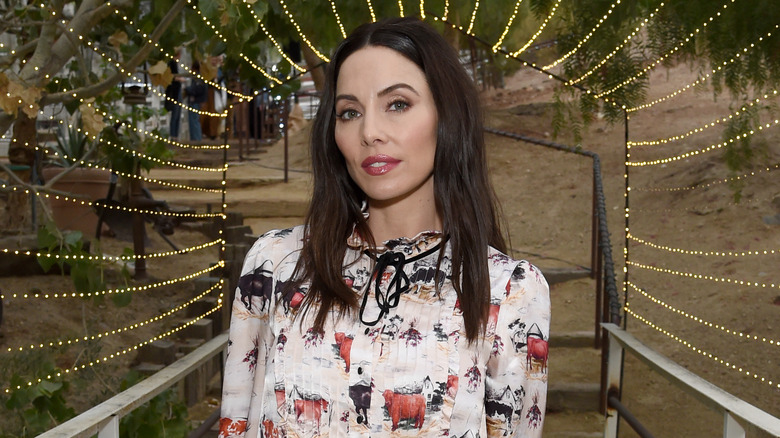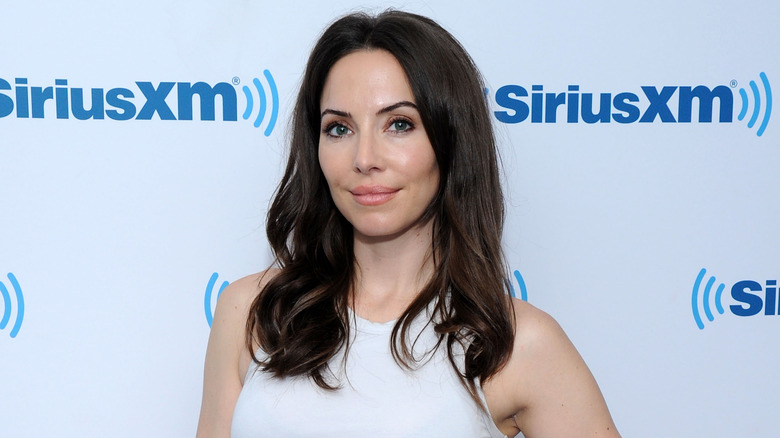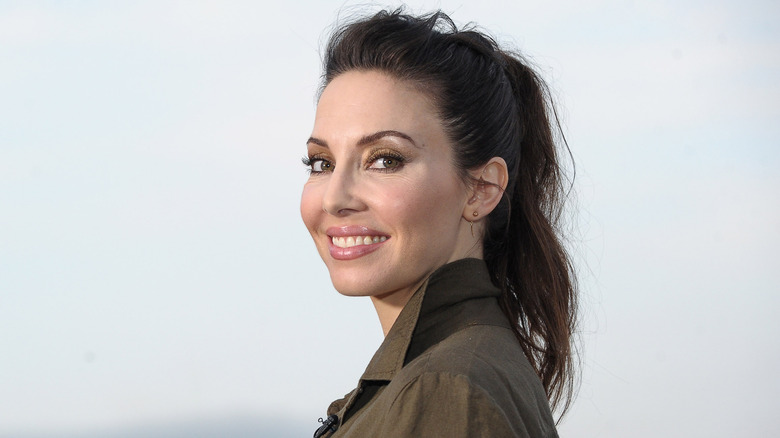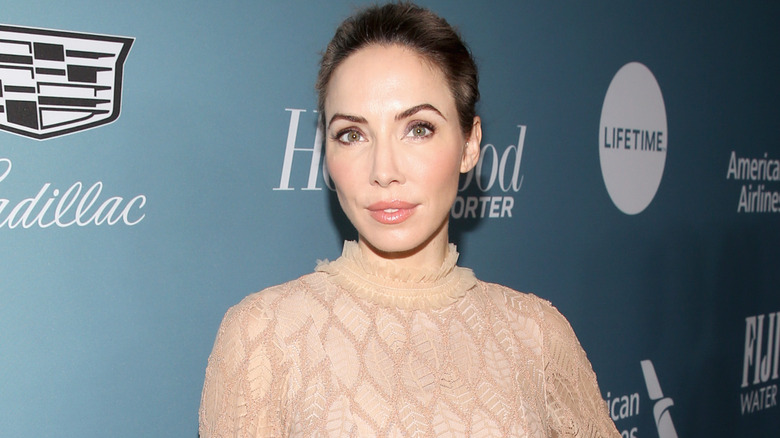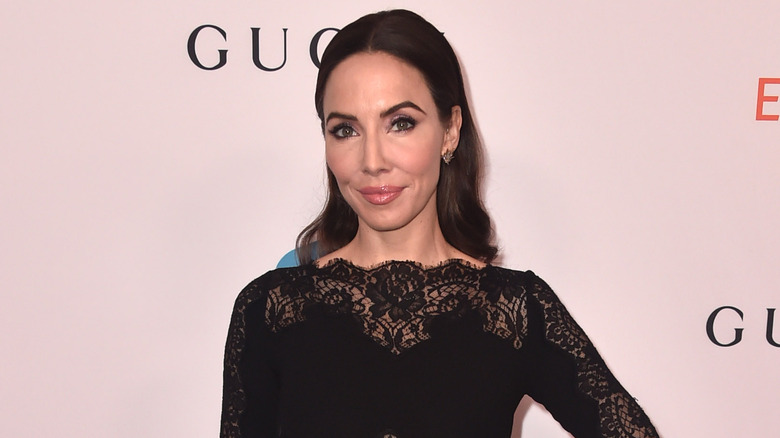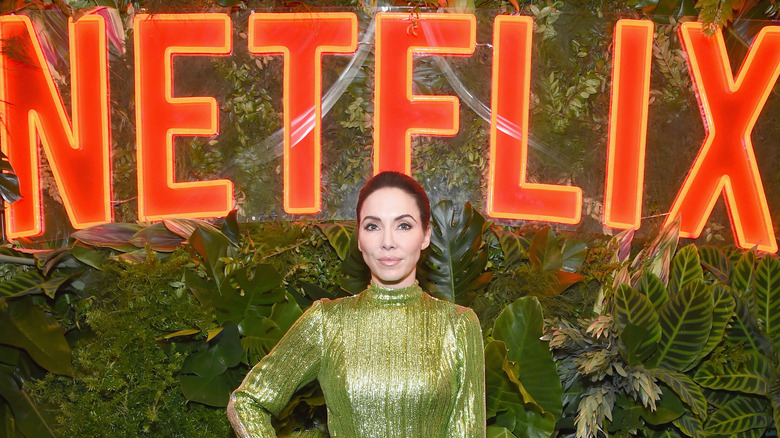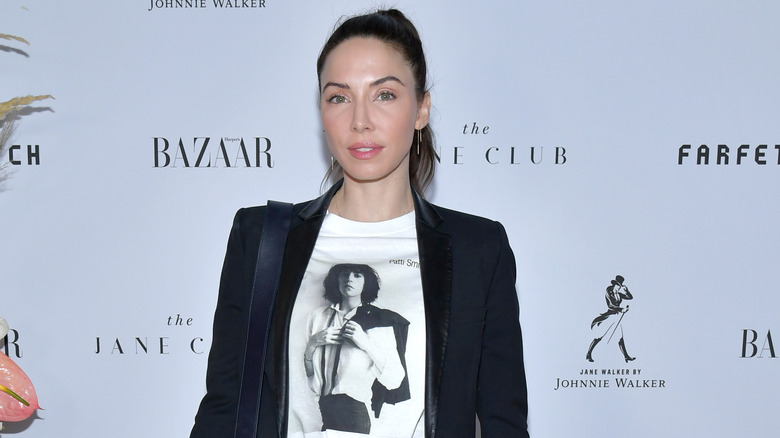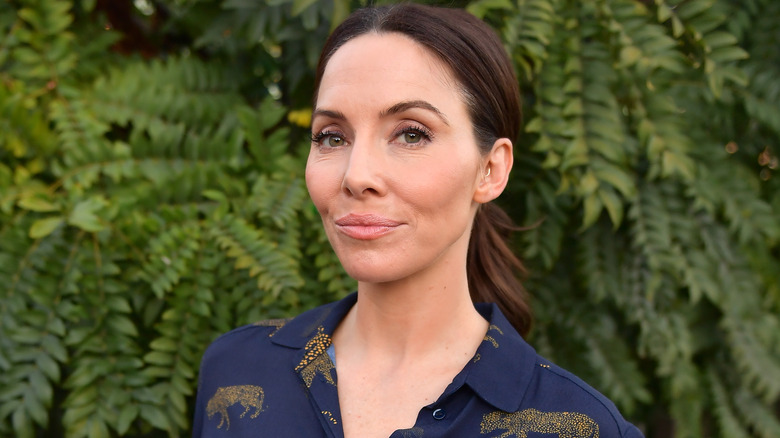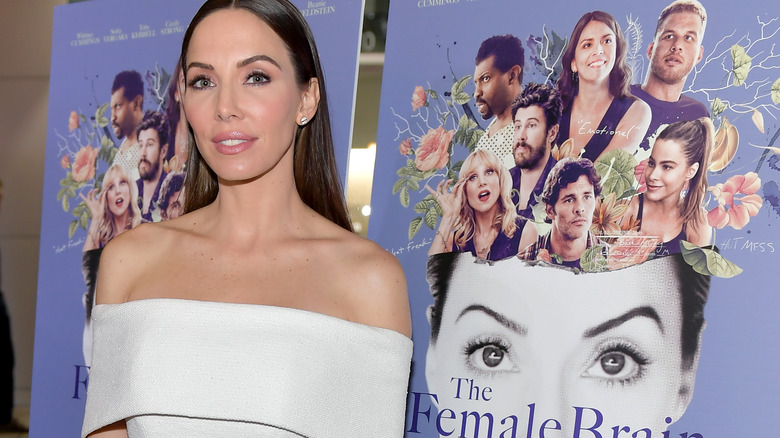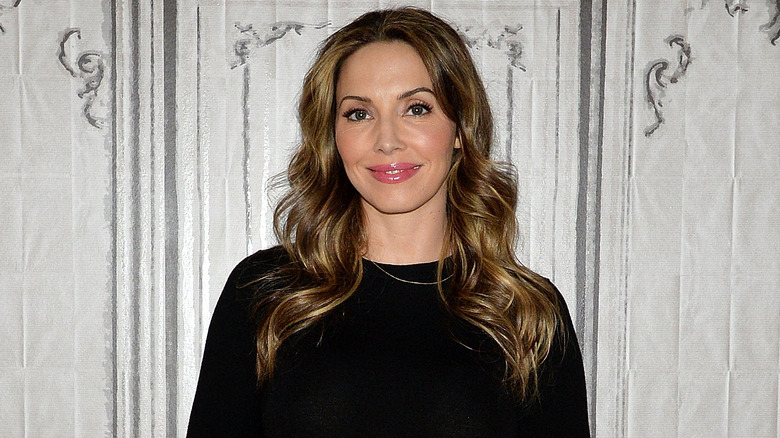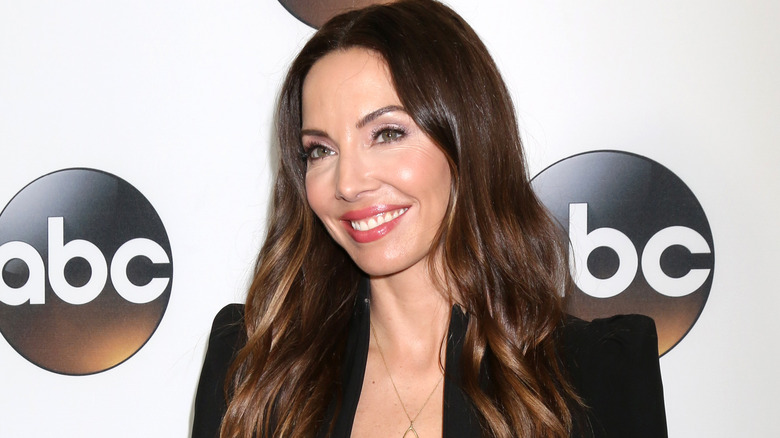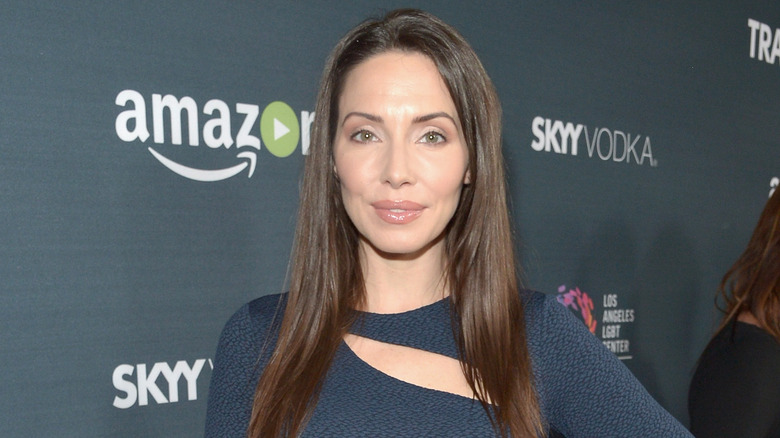Whitney Cummings Dishes On What's Been Keeping Her Busy - Exclusive Interview
Whitney Cummings is incredibly busy. Among other things, she's a comedian, actor, writer, director, co-creator of "2 Broke Girls," and podcaster — and now she's fronting a campaign that encourages women to stop apologizing and start embracing their bodies.
"Annovera saved my life," Cummings told Nicki Swift. "It's comfortable. I'm a very busy person ... You get it once and then you get to be a human being for the rest of your life and just f*** your brains out without having to worry about anything and you can take it out whenever you want. As a working woman, the amount of time I wasted ... trying to find pharmacies around the country when I was touring because I was going to miss my birth control by two hours and then have a baby with a narcissist that I shouldn't be having."
Nicki Swift was lucky enough to catch up with the director of "The Female Brain" to find out more about the new birth control campaign she's supporting, why women should stop apologizing, and how she hopes Hollywood will change in the future.
Whitney Cummings doesn't want to be 'labeled a dirty comic'
You're working with Annovera on the Just Say Vagina campaign, which is about women feeling empowered, and not apologizing for saying the word "vagina." Why was this important to you?
You know, it's weird, I spent so much of my career saying vagina, not realizing it was going to be such an incendiary, taboo term. I didn't realize. And so [when] I started doing stand-up, I was labeled a dirty comic. I was labeled an edgy comic. I'm like, "Why is this dirty?" And I went on stage and I remember the first time I said vagina on stage in the context of a dating joke or something about an insecurity I had, the audience reaction was so mixed. It was like half the people were laughing, the women were like, "Woo," and the men were cringing, and then other comics were like, "Ah, here we go, a girl talking about her vagina."
Okay, you guys have all talked about your wives for the past 60 years, you've talked about airplane food for the past 50 years, how is this somehow ... It's a very loaded area and it's the clinical term. And I found that, when I was a teenager, I was thwarted in my pursuit of medical care and even being able to advocate for myself because I was too afraid to say that word, even to my gynecologist. I lived with my dad a lot of the time and when a tampon commercial came up, I would run out of the room embarrassed.
So, I feel like I was just very much, whether it's religious or socially constructed or whatever it is, commercials I saw, I go to the Rite Aid and there was a whole aisle dedicated to making sure vaginas didn't stink. Douches and what, and I'm like, "Does my? ..." [And when] you were a kid, the kids make jokes about vaginas smelling, and you're like, "What?" And then guys were watching porn, so by the time you hook up with them the first time as a teenager, guys were like, "What is all that hair?" And you're like, "No, it's supposed to be like this, I think." And so there's lots of little traumas, I think, for women that make us default to "We're supposed to be embarrassed about this."
Whitney Cummings found a birth control that works for her
That is such a good thing to try and debunk. And until I looked at this website, I didn't realize that my sister has taught her two sons to call it a foo-foo, which I just think is the worst term I've ever heard.
Well because, can I tell you something, that's oddly sexual to me. You know what I mean? I think of Sophia Loren or Mae West, "My foo-foo," to me, that's ... Vagina is just, why not? I don't think that they're telling young boys to call it a hotdog or a dong-dong. Maybe it's the right thing, I don't know, I'm not a parent, but I just know that I got a lot of mixed messages as a kid, and so when Annovera ... I simultaneously, just luck of the draw, the serendipity that I've struggled with birth controls my entire life, and my second and third special, I talked about it, I complained about every version of a birth control under the sun.
And one of my biggest frustrations is that I never could talk about women's bodies without people thinking I was blue or gross or a dirty, filthy comic, and then Annovera comes along and it's the perfect birth control for me, after looking for 15 years for the right one, and then also they let me say vagina all day. So I was like, this could not be a better situation.
It's a dream come true.
It really is. It really is, I must say.
Stop apologizing to Whitney Cummings
So another part of the campaign is about how women apologize so much more than men do. Do you have any hints or tips for women who find themselves saying sorry all the time?
Well, what I would say is it's pretty savage advice, which is, I think a lot of those type of women, they don't want to be a problem, they want to keep harmony. All I'll say to you is when you do that, you're annoying. That's the only way to get people to stop, because if you say, "Hey, you're enough. Don't apologize if you don't need to," it's so ingrained in our bones, in our cells. What I will say is you are giving your power away when you do that, and also if you're going to be codependent and apologize to everyone all the time, nothing is more annoying than a woman running around that's done nothing wrong being like, "I'm sorry. I'm sorry. I'm sorry," because it makes the person you're apologizing to look like they're abusive.
So that's my new thing with any of the women I work with, they're like, "Sorry, sorry, sorry," and I'm like, "You haven't done anything wrong and it's annoying to me because now you've thrown your insecurities at me, now I have to deal with it." I have to go, "No, you did nothing wrong," and now you're wasting my energy. So I think a lot of codependent ... I'm sorry, addicts, don't realize that they're actually ... We say people-pleasing is a form of a**holery.
If someone's apologizing for something constantly and they didn't do anything wrong, I'm always like, if you did something wrong, tell me. Because all you're doing is apologizing, which makes me think you did something wrong. So did you? Do we need to have a conversation? Because you're carrying a lot of guilt that doesn't belong here. So either go call your dad, go to betterhealth.com, go to a Twelve-Step program, but if you're apologizing to me all the time, I'm going to take you literally and go, "Well, what did you do wrong?" And you're going to go, "Well, I opened the door too soon," and I'm like, "Okay. So what, you're apologizing to me because if you didn't, I would hit you?" You're insulting me when you apologize to me and you've done nothing wrong. So I've taken a more savage approach to it and that's usually when people listen. I was just going to say, just cut it out. It's done. Stop.
Seriously, don't say sorry unless you really need to
So this campaign is saying, "Use the right words, don't apologize, you're good."
Yeah. Did you do something wrong? Then you need to go see a therapist if you're apologizing to me and you've done nothing wrong. I'm 14 years in basically Al-Anon and Co-Dependents Anonymous, it takes a lot of work to unwire that s***, but if I've hired you, it means I think you're amazing. If you don't think you're amazing, that's your problem. You need to go deal with it because I'm paying you to be here, so you're saying I'm dumb. You're saying I made a bad hire. So to me, we don't understand all the time how our insecurities are insulting to other people.
I did a 30 days no apologizing challenge. It took me like eight months to get through 30 days, but you go like, I'm not going to apologize unless I've done something. Because also, when you do really actually need to apologize, it's going to have no power and there's nothing more powerful than saying, "Hey, you know what guys, that was my fault." There's nothing more impressive than someone who can apologize with elegance and grace, but if you're running around apologizing all day, then when you actually need to, I'm going to be like, well, it doesn't mean anything.
So it's a big thing, especially as women are like, "We want to be in the workplace and we deserve to be here," and then they get there and all they do is act like they don't deserve to be here. Honestly, if you can't do it, just pretend you can and then go cry in your car after.
Anything that gives the women agency is a good thing.
Yeah. Just copy the men for a little while. You don't see men running around like, "Oh, I'm sorry. Oh, I'm so sorry. Oh, I'm so sorry, I'm too early. I'm sorry I'm early." Guys don't do that. Just copy them until ... I just had to fake it. I want to say I'm sorry constantly and I would just bite my lip the whole time.
Who are Whitney Cummings' dream podcast guests?
We want to talk about your podcast, "Good For You," because you've had some amazing guests on there so far; Paris Hilton and Amanda Knox were recent ones. Who would be your dream guests?
Oh my gosh, yes. Billie Eilish is a huge dream guest. Because during the pandemic, I only brought people on this show that I was okay with killing with COVID. I'm kidding. That's not going to translate well in print at all. But no, there's a couple people. Dolly Parton, Billie Eilish, those are the dream, dream, dream, dreams. I also have to say, as I've been doing this podcast, you realize that fame and celebrity, sometimes it hits, sometimes it doesn't. I think it's really about, in a podcast, the chemistry between the two people, and sometimes when I have really famous people on, I kind of am like, "Oh my god, I don't want to get you in trouble. I don't want to get you canceled." I can't say anything I want to say or make the jokes I want to make. Because it's three hours of hanging out with a comedian. Something's going to go sideways, you know?
And so when Paris Hilton was here, I barely spoke. I was just, "Oh god, I do not want to get her in trouble." And so I have a couple dream guests that are women, because when we look at all this stuff about women and Me Too and finally, it's not the first time this has happened. We just were never able to connect through Twitter. Women like Alanis Morissette and Tori Amos and Etta James. There are women that were expressing these sentiments, but not in a way that could catch fire on Twitter, it was through their music or something.
I go back and I listen to Tori Amos and Alanis Morissette and Ani DiFranco and Fiona Apple and I just, oh god, I was screaming lyrics to your song when I was younger, but I didn't even understand what you were really saying until becoming an adult woman. And so I want to have a lot of those women ... on the podcast to go through, just pick their brains and celebrate a lot of the lost women that were trying to say all this, but couldn't. Cher would be amazing. Sharon Stone, oh, dream. A dream.
That's a good point, though. A lot of people were trying to speak out about these issues and no one really listened before.
They'd only listen if they were dancing and it was music, and it was always female rage. It was marketing that as a unique thing, only for women that got dumped by David Coulier, who gives a f**k about him. So I want to go back and just go, oh my god, we didn't listen. Mary J. Blige, ah, now I hear that. I just want to pay credit where credit's due on a lot of people that aren't being highlighted at the moment.
Whitney Cummings on getting a Netflix special
How has the standup comedy scene changed with streaming services? Is getting a Netflix special the epitome? Is that what everyone wants now? Is that like being cast in a Marvel or Star Wars movie?
Wow, what a great question that has a very annoying answer. Yes and no. Things are moving so fast and changing so fast, if you shot a special five months ago and it comes out today and it's just like, "My life is hard because my wife is a drag." Everyone's watching people of color being targeted by the police and what's going on in the news now, it's all of a sudden like, "Oh, that's your biggest problem? Your wife that loves you is nagging you about the dishes?" So, it's an interesting thing, because when you make a special, by the time you make it and by the time it comes out, it could be incongruous with what's going on. It could be like, oh wait, this is irrelevant all of a sudden, or maybe it's timeless ... It doesn't really matter where your special is, it just has to be incredibly smart and incisive and take risks and be very personal. If you look at the ones that have stood out, it's "In & Of Itself," I think what it's called, that one on Hulu, Hannah Gadsby, a lot of them ... I had a robot in mine, I was so desperate to cut through the clutter, my last special had a robot that looked exactly like me in it. You have to start a conversation. I was trying to start a conversation about sex robots and maybe this will be something that benefits women. because now that women are working, the thing we say all day is, "I wish I had a double."
Originality is more important than ever to Whitney Cummings
Whitney Cummings: So I like to play devil's advocate on things that people think are going to be bad for women and figure out how they can actually benefit women, and so I brought a robot. You got to be memorable and it has to still be interesting. It can't be ephemeral, so people [are] still like, "Dude, I just watched your special. That robot's crazy." And that's still shocking a year and a half later, whereas someone going, "Hey, so your boyfriend came home late?" No one cares. It just has to be something that really drives conversation, because we're all subject to the algorithm, we're all victims of the algorithm. If you don't have people on Twitter ... It used to be these big publicists at ... Warner Bros. decided if you've got a banner over the ... We were in the hands of a bunch of businessmen, if you've got a billboard in a certain place.
But publicists now, at least the smart ones, are like, "Hey, talk to you, for example. Talk to this person and go on this podcast." Things sometimes I've never even heard of, but they're fans. It's not necessarily ABC or NBC or "The Tonight Show" or whatever, it's this loyal group of fans. So having something unoriginal on Netflix is not necessarily better than having something super, super original on TikTok or YouTube or Instagram. We have to be smarter about what we do in specials now because they can ... I mean, think about all the specials that have come and go that you didn't even know on there. Ali Wong came out pregnant, being hilarious, and people were like, "What?" It kept being interesting. So I think those are the ones that cut through all the endless amount of content.
You've got so many things to think about just to make a special these days.
Yeah. You've got to be smart. Audiences are smart and audiences don't want to see, in my opinion, just the same s**t they've seen. Jokes about fat chicks, lazy stuff nobody wants to see. Things that aren't fresh and making us think. Because there's so much talent on Instagram and TikTok and YouTube that's really original and taking risks because they have nothing to lose. That's what we're competing with. People that have nothing to lose and are not giving in to all the Twitter, "Don't say this, don't say that," and they're just going for it. So it's almost as competitive as ever.
Whitney Cummings is ready to play a Star Wars villain
My editor also wanted me to ask, would you want to be in a Marvel or a Star Wars movie?
Who asked? Who wants to know? ... George Lucas? Yes, of course.
Right. Let's make this happen.
I just did a little TV show ... For a friend of mine, it's not little, it's probably the biggest show, Liza Koshy show, it's on YouTube, but it's bigger numbers than any network TV show, and I got to play someone really evil and that is really where I think I shine the most. I think because I said vagina in the past, before Annovera, any of that, I was always given, as for parts, of the sex-crazed, crazy lady who's screwing everybody's husbands, and I'm like, "I don't think wanting to have sex and being sexual means you're a failure or a bad person."
I love the movie "Bad Teacher" and Cameron Diaz is my hero, but I started going like, "Oh, there's this relationship between being sexual and being a mess," and I'm like, "All the women I know are pretty sexual and into sex, but they're running companies." Just because you like sex doesn't mean you're a bad, amoral person. And so I started to get all these amazing opportunities and I was like, "I just don't want to become this ... boxed in as this person." And then I made a movie about being a neuroscientist and I'm trying to let people see me [in] other ways. Yes, I would love to play a villain in a Marvel movie, and in Star Wars, I would like to play Darth Vader so I don't have to wear makeup.
What is Whitney Cummings' plan for future movies?
You made your directorial debut with "The Female Brain," which you co-wrote, directed, and starred in. Will you be making more movies?
I don't know. The movie business is a s***show at the moment. I'm sorry. Now that I say "just say vagina," I just say way too many other things I shouldn't say. They're like, "You can say vagina, but all your other opinions, keep to yourself." It's just a little bit, right now, I think with the kind of stories that have been told for the longest time, I only want to be a part of things that are moving the ball down the field, that are fresh, that aren't stereotypes of women, or aren't something we've already seen, because you give seven months of your life to something and sometimes it just comes out as a little tiny picture on Netflix and someone just goes right past it and you put your heart and soul into it.
So for me, I'm just picky with the kind of stuff I do. And then just some other movies that I've wanted to make for the longest time, but I never felt like the studio system would allow me to do it. I used to go into studio meetings and they'd want to make a movie with me and I'd be like, "Oh great, it's about these two women that are 38 and they just froze their eggs and they want to have a Rumspringa before they have kids, be a surrogate or something," and they'd be like, "Oh great. They're 38, let's" — this was also 10 years ago — "Let's cast Mila Kunis." She's 30 and looks 20. It was always like, "No, they have to look 38." And they're like, "Okay, great. How about Emma Stone? She just turned 25." And I was like, "Ah!" How about Reese Witherspoon or Cameron Diaz, my favorite. How about Catherine Keener, Emily Mortimer.
So I always just felt a little bit like the final product was going to be embarrassing, even though I had good intentions. And now there's so many more people and women and people of color in the business now that I just want to align with, I think, the people that get it and aren't trying to appeal to the lowest common denominator.
Well, I want to see those movies. I want to see movies with real women in them.
I mean, I'm going to have extensive Photoshop in post, but everyone else will look totally makeup free. I'm kidding.
Comedians are naturally dramatic
A lot of comedians have transitioned to dramatic roles, including yourself. So do you think standup comedy prepares you to act and be dramatic?
You know, I actually think when we look at the careers of Robin Williams and Richard Pryor and Jim Carrey and Sasha Baron Cohen, Sandra Bernhard, actually, you forget about that performance. I think that comedians are specifically qualified, if not overqualified. And by the way, the Lucas brothers, Daniel Kaluuya, who played Fred Hampton in "Judas and the Black Messiah," won the Oscar for playing Fred Hampton, but the Lucas brothers wrote that movie, they're comedians. A movie about a Black Panther who was killed by the FBI and its unbelievably gripping and dramatic. Comedians, I think we were drama people first, and then the way that we see the world just happens to make people laugh because of the way we speak.
Sarah Silverman, god, she had a performance, I can't remember the name of the movie, it was unreal. And I think a lot of people, when they think someone's funny, it's just hard to see them do drama, especially if it's a woman for a second. I hope that's changing with people like Issa Rae and Phoebe Waller-Bridge, but it makes us uncomfortable, the cognitive dissonance or something, because we're like, "Oh, I'm about to laugh," and then it's like, "Oh no, you're hurting my friends. You've made me laugh before and now you're injured or hurt or assaulted or something."
But yeah, I think comedians, I won't speak for all of them, but everyone ... I'm so confused, everyone's always like, "Comedians are all suicidal and mentally ill and deeply dark." And then you're like, "Okay, that's what people think about comedians." And they're like, "But they can only do comedy." Well, which is it? Pick a lane. You know that we're broken and probably come from some kind of emotional trauma, ancestral trauma, some kind of horrible thing, and that we can access sadness and we're all suicidal, but you won't hire us for any of those roles. So which is it?
So yeah, I think that comedians are specifically incredible at drama. It's just a lot of people won't let us do it because Hollywood has this obsession with putting people in boxes, and it's so boring and you wonder why the business is falling apart.
If you or anyone you know is having suicidal thoughts, please call the National Suicide Prevention Lifeline at 1-800-273-TALK (8255).
Whitney Cummings on why we need original female-led movies
Whitney Cummings: I just think that this business, hopefully soon, it's going to see that doing the same thing over and over again and expecting a different result is not going to get them what they want. Looking at the people that came in, Tiffany Haddish, she can do anything. It was like after "Bridesmaids" came out, I got all these calls — I'm sure a lot of women did that were way more successful than me — saying, "Oh my god, can you make the next 'Bridesmaids'? Can you make the next 'Bridesmaids'?" Four women on a divorced trip, four women on an office trip, four women going crazy on a camping trip.
And I just remember being like, this is so backwards, because it made money, not because anyone was a feminist, the whole approach was let's replicate that thing that just did well. And I was like, "No, no, no, no, you don't replicate the thing that did well, you replicate the originality behind the risky idea." So don't call me saying let's make another "Bridesmaids". Call me saying let's make another super original idea with a really fresh cast and taking a bunch of risks, not duplicate the same. And then they ended up making a bunch of movies with four girls, a bachelorette party, and then here and here, four girls doing ... And it doesn't work and they wonder why. And they're like, "Oh see, women aren't funny. That was a fluke." I was like, "No, you just tried to repackage the same movie again and you threw all these actors on the box."
Hollywood needs better representation
Yeah. I just really want to see more diversity, to be honest. I'm disabled and it drives me nuts that there's just no good representation. So if you could make something...
Please. ... I think that people in our business are a little bit trepidatious about that because they're worried they're going to get it wrong or not cast, because their conversation is, cast someone that's actually disabled, where do we find them, with a lot of unions, it's not legal to ask, and I think a lot of people come in— I think there needs to be a very big conversation about this in a fearless way where people aren't afraid to be embarrassed and ask dumb questions. Of saying, like, "What's the difference between this type of disability and this type of disability? How would they move? If the character's autistic, what should that look like?" Do you cater the role to the actor so that it's authentic instead? Because I'm big on just hiring the actor and then you just write it for them specifically, so there's no pretending or impersonating. ... Because then there was Ed Norton in, what was that movie where he played ... because the conversation, and I'm not trying to be stubborn, but this business is actors that are not disabled come and play disabled, and that's a surefire way to get an Oscar. But then you're probably like, "Just hire someone that ..." And they're like, "Well, it's acting." And it's like, okay, but we're now at a place where the white guys don't get to get awards for playing ... You know what I mean? Now it's time to think differently and cast differently, and it would be a great conversation to have with a bunch of casting directors.
A big part of the problem is that there's no one behind the scenes disabled either. If you don't have disabled writers and disabled directors and casting directors, you're not going to get it right. It's not enough just to say, I want a disabled person in that role. You need to look at the whole picture.
Yes. Josh Blue, I don't know if you know him, he's a comedian. He's fantastic. Because there's a lot of people that are like, "I don't want to be a writer." Okay, how do we find ... I don't know if you've seen Ramy? His best friend in the show is his real best friend, and I think, you might tell me I'm wrong, but I think they handled it really, really beautifully. His real best friend is a guy named Steve Way who has muscular dystrophy, and he wrote it for him, obviously, which a lot of people might not have the luxury of.
Check out Whitney Cummings' new campaign with Annovera, Just Say Vagina.

